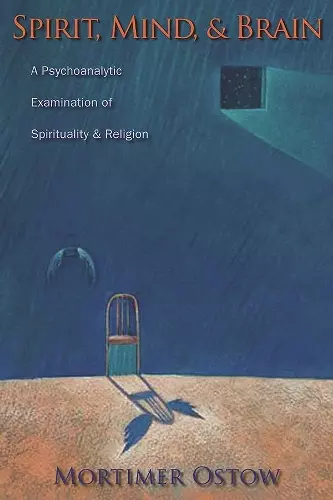Spirit, Mind, and Brain
A Psychoanalytic Examination of Spirituality and Religion
Format:Hardback
Publisher:Columbia University Press
Published:5th Jan '07
Currently unavailable, and unfortunately no date known when it will be back

Mortimer Ostow, one of the most interesting psychoanalysts of our generation, has from the beginning of his distinguished career combined his interests in neurology, psychiatry, and psychoanalysis in the treatment of his patients and in his thinking about the mind. A scholar of the Talmud and a student of religion, Ostow addresses a family of interrelated issues-spirituality, religiosity, and mysticism-that have been ignored by both psychoanalysts and by students of the brain. An extraordinary book. -- Eric R. Kandel, Columbia University College of Physicians and Surgeons In this illuminating study, Mortimer Ostow, a world-renowned psychiatrist and psychoanalyst and a committed Jew, offers the fruit of decades of reflection on the varied ways in which psychology and religion interact to shape our inner life. Ostow's most original contribution is to reject the conventional view that religion and psychological health are incompatible. He views these two impulses as not only interdependent but even indispensible for the shaping of a mature identity. Required reading for all who are concerned with the place of the spirit in the tumult of modernity. -- Neil Gillman, professor of philosophy, Jewish Theological Seminary of America Mortimer Ostow enriches our understanding of religious motivations as he weaves a powerful image of our spiritual nature. In his integrated vision, the light of science illuminates the perennial mystery of human faith and religious urges without diminishing the spiritual journey that is such an important feature of human life. -- Jaak Panksepp, Washington State University, author of Affective Neuroscience Mortimer Ostow's most original contribution is to reject the conventional view that religion and psychological health are incompatible. He views these two impulses as not only interdependent but even indispensible for the shaping of a mature identity. Required reading for all who are concerned with the place of the spirit in the tumult of modernity. -- Neil Gillman, Jewish Theological Seminary of America
Believes that early childhood emotional attachments form the cognitive underpinnings of spiritual experience and religious motivation. Classifying the three parts of the spiritual experience: awe, Spirituality proper, and mysticism, the author discusses the foundations of religious sentiment and the processes associated with spiritual experience.Preeminent psychoanalyst Mortimer Ostow believes that early childhood emotional attachments form the cognitive underpinnings of spiritual experience and religious motivation. His hypothesis, which is verifiable, relies on psychological and neurobiological evidence but is respectful of the human need for spiritual value. Ostow begins by classifying the three parts of the spiritual experience: awe, Spirituality proper, and mysticism. After he pinpoints the psychological origins of these feelings in infancy, he discusses the foundations of religious sentiment and practice and the brain processes associated with spiritual experience. He then focuses on spirituality's relationship to mood regulation, and the role of negative spirituality in fostering religious fundamentalism and demonic possession. Ostow concludes with an analysis of an essay by the psychoanalyst Donald M. Marcus, who recounts his own spiritual experience during a Native American-style "vision quest" in the woods. Marcus's account demonstrates the constructive potential of spirituality and the way in which spirituality retrieves and recapitulates feelings of attachment to the mother. Persuasively and brilliantly argued, Spirit, Mind, and Brain brings the disciplines of religion, behavorial neuroscience, and philosophy to bear on a groundbreaking new method for understanding religious ritual and belief.
ISBN: 9780231139007
Dimensions: unknown
Weight: unknown
232 pages